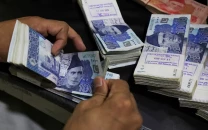Govt basks in two-thirds glory
The reserved seats had also led to a face-off between the Parliament and the Supreme Court

Finally, the Pakistan Muslim League-Nawaz (PML-N) on Friday emerged as the single largest party, with the party and its allies simultaneously securing two-thirds majority in the National Assembly after the Supreme Court allotted reserved seats to the ruling coalition.
The current parliamentary as well as political equation in the country changed after the top court turned down the Pakistan Tehreek-e-Insaf (PTI)-turned Sunni-Ittehad Council (SIC)'s request for the allotment of the reserved seats after hearing a review petition.
On July 12, 2024, the Supreme Court had declared PTI a parliamentary party and held that PTI was eligible to get reserved seats that were earlier distributing among other parties in the national and other assemblies by the Election Commission of Pakistan. However, the SC ruling in the review petitions has now reversed the same.
At the moment, the total number of seats of the ruling alliance stands at 237, including 125 of the PML-N, 74 of PPPP, 22 of Muttahida Qaumi Movement-Pakistan (MQM-P), five of Pakistan Muslim League-Quaid (PML-Q), four of Istehkam-e-Pakistan Party (IPP), one each of Balochistan Awami Party (BAP), National Party (NP) and Pakistan Muslim League-Zia PML-Z) and four independents.
On the contrary, the opposition alliance has total 99 seats, including 80 of SIC & independents – primarily PTI – 11 of the Jamiat-e-Ulmae-e-Islam-Fazl (JUIF) and one each of the Balochistan National Party-Mengal (BNP-M), Pashtunkhwa Milli Awami Party (PkMAP) and Majlis Wahdat-e-Muslimeen (MWM).
After the results of the Senate elections in April 2024, the PMLN-led ruling alliance has a dominating position in the upper house of the parliament with 61 seats, including independents, as opposed to the opposition parties' 24 seats.
The majority of the coalition government has put it in a commanding position in both the National Assembly and Senate as it can now even go for constitutional amendments without facing any hindrance from the opposition parties in both the houses. For any government to obtain a two-thirds majority in the 336-member National Assembly, the backing of 224 lawmakers is required.
Previously, when the government had fell short of passing the 26th constitutional amendment, it had managed to win support from an opposition party JUI-F. Now, the ruling alliance won't need support from the opposition benches to pass any constitutional amendment, which requires two-third votes from the Parliament.
The reserved seats had also led to a face-off between the Parliament and the Supreme Court as Speaker National Assembly, Sardar Ayaz Sadiq, had written a letter to the ECP, urging it to respect parliamentary sovereignty in the allocation of reserved seats to PTI.
The letter had come after the SC had ruled that independent candidates, after winning elections, could join political parties and alter their political allegiance followed up by a note released by eight SC judges directing ECP to implement the judgment at the earliest.
Through his letter, the Speaker had pointed out that Parliament passed an amendment to the election law, saying it prohibited independent candidates who join a party post-election from switching their affiliation.
He had emphasized the amendments to the elections act must be applied when the ECP allocates contested seats, highlighting that the SC judgment was rendered before the new law was passed and thus become outdated in light of the legislative changes.




















COMMENTS
Comments are moderated and generally will be posted if they are on-topic and not abusive.
For more information, please see our Comments FAQ